Cigna Healthcare has been in step with this evolution over the past nine years, enabling our customers, clients, and partners to understand this changing dynamic – and be part of it. In this way our services today reflect the real needs of people and organisations.
As part of our forward-looking practice, we commissioned the Cigna Healthcare Vitality Study: measuring twelve markets around the world and comprising eight key aspects – social, occupational, financial, intellectual, physical, spiritual, emotional, and environmental – it provides us with a comprehensive overview of people’s ability to thrive both individually and in an organisational setting.
Table of contents:
- Vitality goes beyond common notions of health
- Culture and demographics matter
- Mental health is critical
- Money worries exacerbating stress
- Work culture is improving
- Pandemic reprioritisation continues
- How employers can help
- Why we should embrace vitality
- About the research
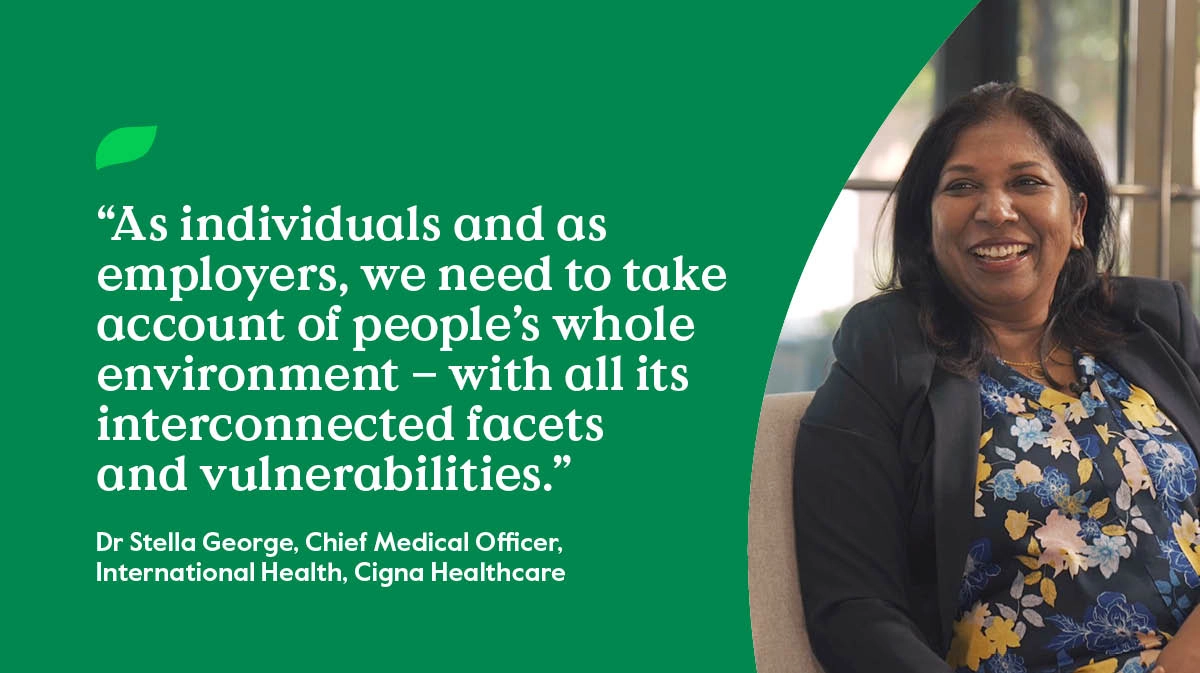
Vitality goes beyond common notions of health.
Only one in five of our respondents displayed a high level of vitality. Perhaps reflecting the modern knowledge economy with its focus on upskilling and personal development, we also observed that people see broader aspects of vitality, such as intellectual health, as being of greater importance than physical health.
When we asked people to score how well they are doing across various aspects of vitality, over half said they ‘value learning new things’ and ‘have a place where they can feel safe and well’. Both are higher than prioritisation of physical health and having ‘the skills and tools necessary to live a healthy life’. Social health was also ranked amongst the top three aspects of vitality, but with less than half agreeing they can build connections with others, there’s room for improvement.
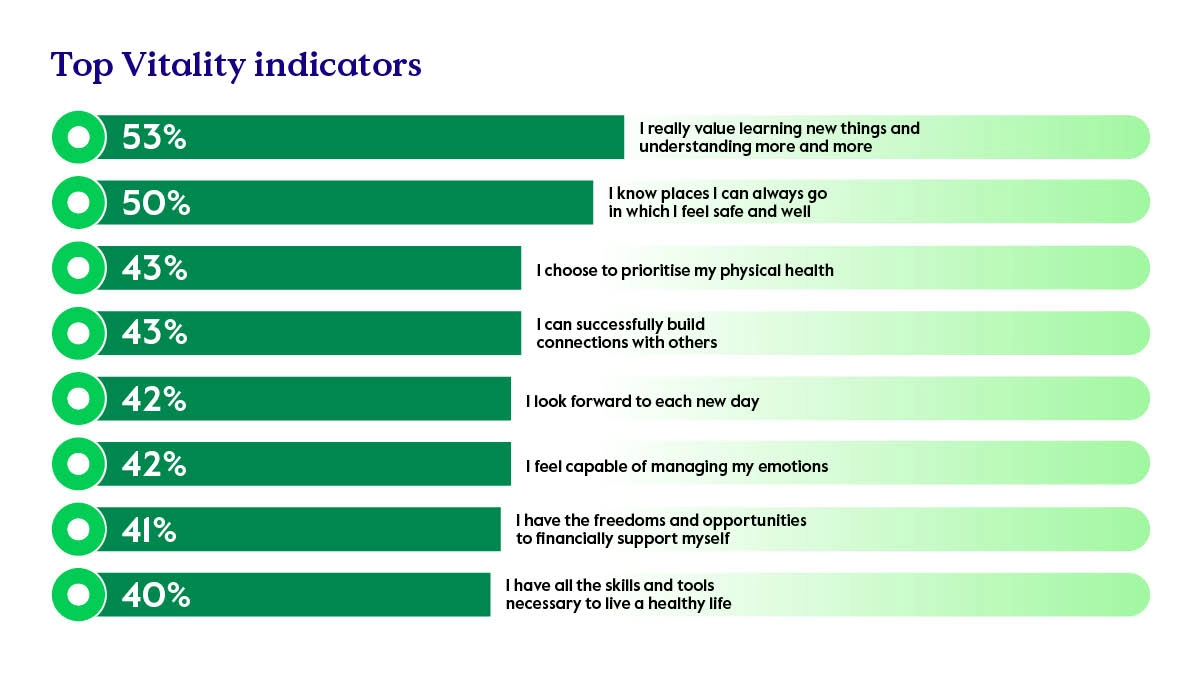
Culture and demographics matter.
There are major differences in reported vitality levels between markets, with mainland China, Africa, and the Middle East at consistently higher levels, while Hong Kong, Singapore, and European markets scoring lower. Culture and identity likely play a major role in these differences; for example, the expectation to manifest positivity is stronger in some cultures than others.
In terms of demographics, men reported slightly higher vitality than women, and millennials, aged 25-44, were the highest-scoring generation in overall vitality, while Gen X, aged 45-59, was the lowest. These differences could be linked to the amount of responsibility each group shoulders, with women typically assuming more unpaid childcare and household duties,1 and many Gen Xers having to support children and older parents while planning for their own retirement.
Mental health is critical.
Although the ability to manage one’s emotions was ranked fifth among all the dimensions of health, emotional or mental health remains the most important indicator of overall vitality. When asked to rate their mental well-being, responses diverged greatly between those with high and low vitality scores: 84% of those with high vitality said they have strong mental well-being compared to only 10% of those in the low vitality group.
Those with low vitality also tend to be more stressed (9 in 10) compared to those with high vitality (7 in 10). Stress has declined since the peak of the pandemic, from 82% of people experiencing stress in 2022 to 80% in this year’s study. Burnout, which we reported as being at almost universal levels in 2022 persists, with 94% still reporting at least one burnout symptom over the course of the past year.
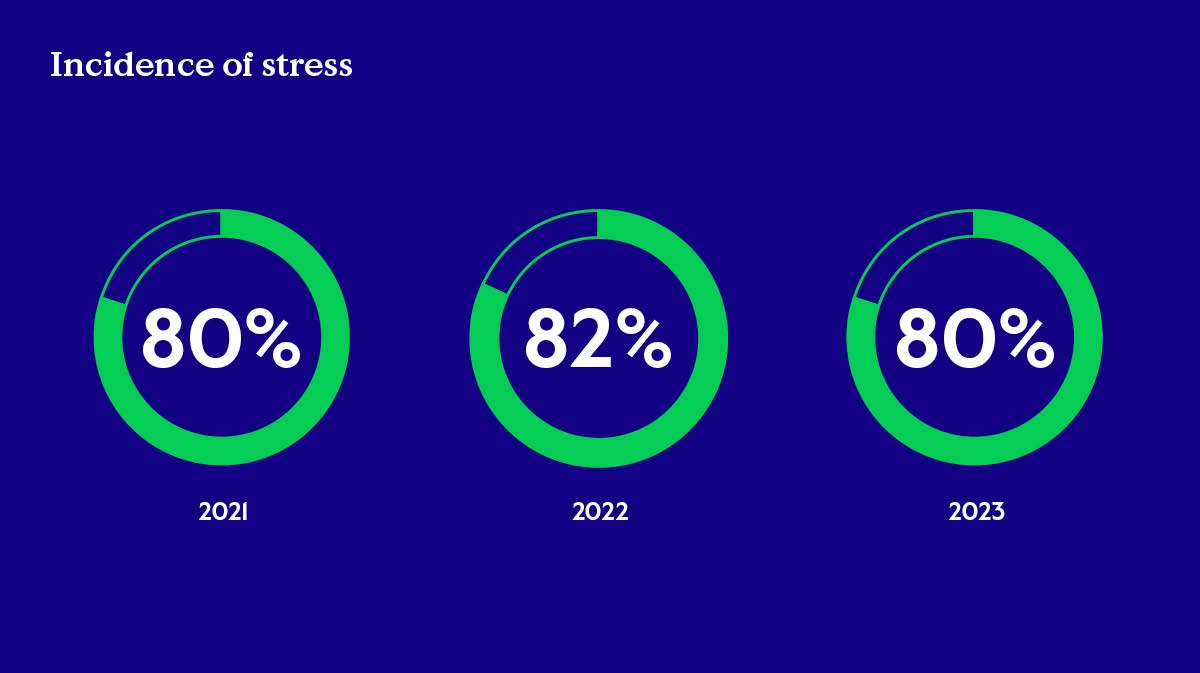
Money worries exacerbating stress.
The ‘cost of living crisis’, caused by global inflation, is the leading cause of stress, as mentioned by nearly half of the people we spoke to. This was closely followed by the linked issues of ‘uncertainty about the future’ and ‘personal finance’. With global interest rates set to continue to remain high in the months ahead, people’s financial concerns are likely to remain high for the foreseeable future.
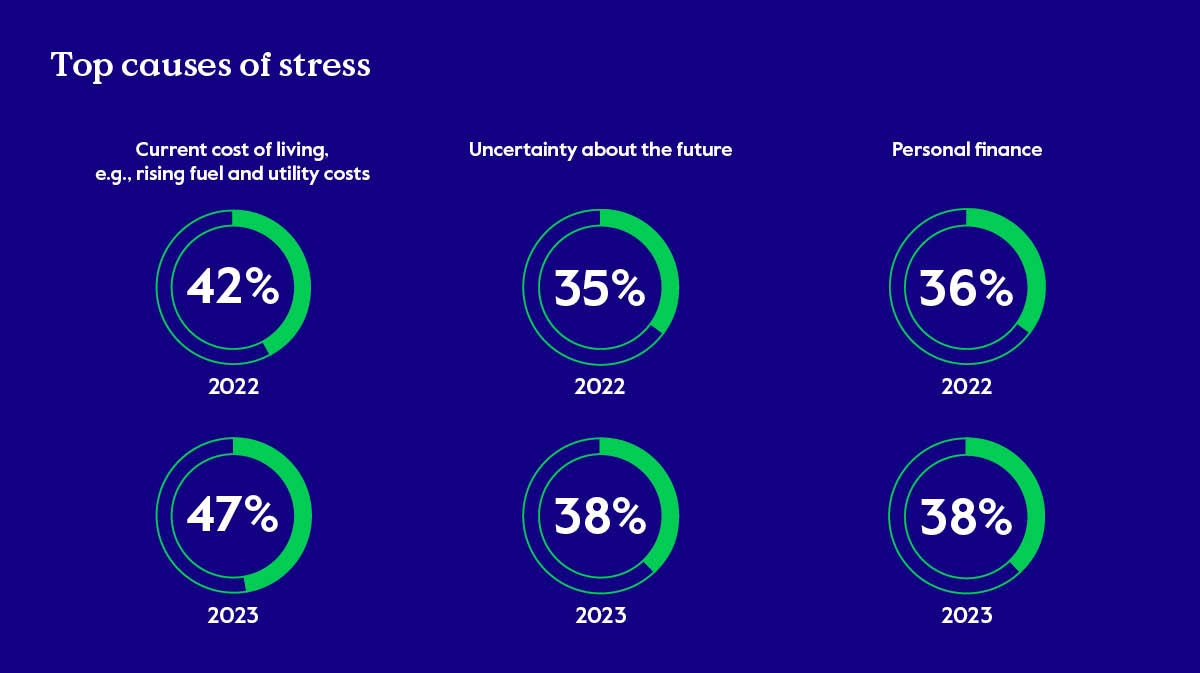
Work culture is improving.
Despite the ongoing stress levels, we do see an overall improvement in some of the scores associated with work. Working patterns have stabilised, with 56% of people now working full-time back in the office and the remainder working predominately in a hybrid manner.
The return to a regular office routine appears to be recognised as delivering productivity benefits, with 44% saying they felt it was the most productive environment. Among those who have returned to the office full-time or adopted a hybrid model, one-third indicated that they have closer relationships with coworkers, and three in ten say they can concentrate better at work.
Perhaps unexpectedly, this appears to have helped bring down stress levels associated with work, with 67% saying they feel constantly connected to work and unable to switch off, compared to 72% in 2022. We also see an overall reduction in the number of people working outside of normal working hours, down to 65% from 69% last year.
However, there are still disparities between regions, with people in Europe less likely to work beyond office hours (16%), while in the Middle East nearly a third (32%) work after hours. Despite this, we also see the Middle East reporting a higher benefit from in-office working, with 45% saying they have improved concentration in the office, compared to only 14% in Europe.

Pandemic reprioritisation continues.
During the pandemic, many people reexamined their lives and what mattered to them – with many trying to achieve a better balance between work and family life, and some even opting to take early retirement. According to our study, these habits and attitudes have become set.
Three quarters of people say being close to their family and friends has become more important after the pandemic, and 71% say looking after their health and well-being is more important than before. The rebalanced work/life equation is also holding fast, with 60% saying they value time for themselves over a well-paid job and that they still want to make changes to their lifestyle and life priorities.

How employers can help.
There is a clear role for employers to step in and support people, as the cost-of-living crisis is having a direct impact on health. 67% of people say that inflation is making it too expensive to stay healthy, and 59% of employees say they wish they had more support from their employer to live a healthier life.
This is where our vitality approach fits in. When asked their top three preferences in terms of a robust health and well-being program, the number one was a private health insurance plan. However, this was followed by ‘flexible time off or work arrangements’, mentioned by nearly half of everyone we spoke with, and mental health support, raised by over a third.
Interestingly, subsidised gym memberships, perhaps the most traditional form of health support from employers, was only mentioned by a quarter of people worldwide, and by as few as one fifth in North America.
Why we should embrace vitality.
With global well-being remaining fragile in the face of continued macroeconomic challenges and geopolitical uncertainly, the vitality approach is critical to protect and enhance people’s health.
By encompassing crucial aspects of well-being, energy level, and attitude towards life, vitality offers us a more accurate sense of health in modern society.
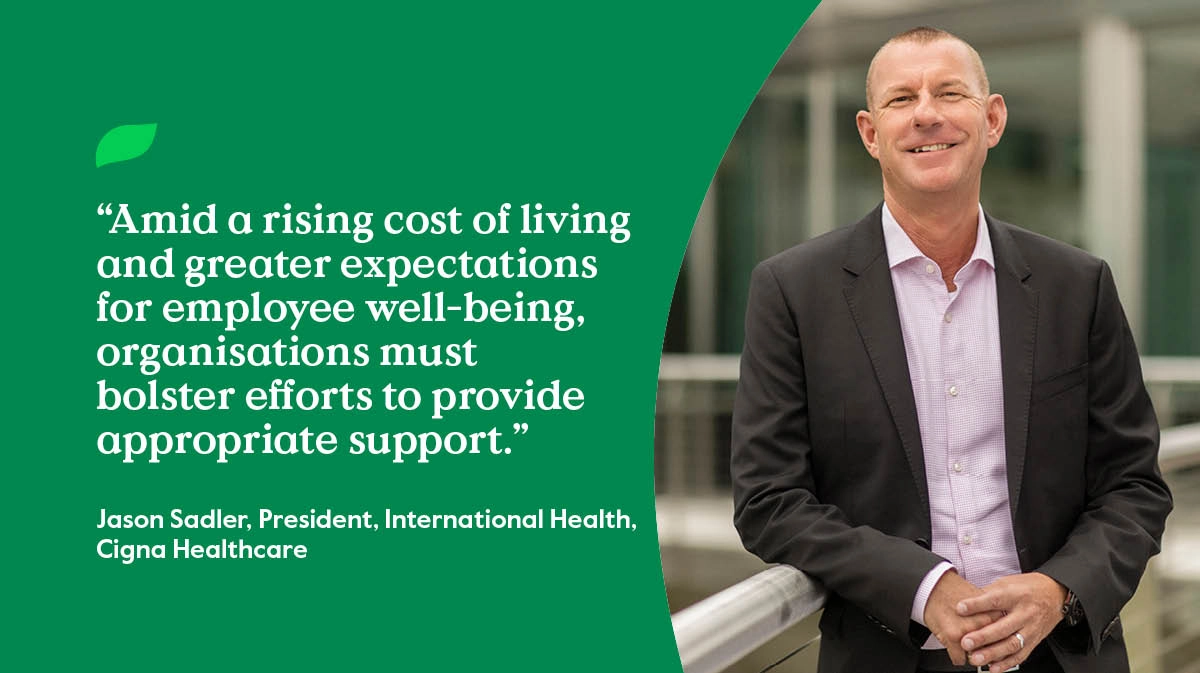
As our study indicates, people’s understanding of health is now more balanced, with mental health generally viewed as being just as important as physical health. We also see the continued desire for better work-life balance, often at the expense of professional ambitions. This presents a challenge to employers and society. The long-established model of work as a ‘place’ has been disrupted, and many people further question its ‘function’. As businesses and economies rebuild in the face of considerable headwinds, the need to retain and motivate talent will be crucial, requiring organisations to look more closely at their overall approach to vitality.
Our findings show employers need an approach that respects vitality on an individual level. Organisation success is best achieved by providing employees with the support they need to be at their best and integrating this with the organisation’s collective needs.
About the research
We surveyed more than 10.800 respondents in 12 markets – the US, UK, Spain, Netherlands, Belgium, Switzerland, Kenya, UAE, Saudi Arabia, mainland China, Singapore, and the Hong Kong SAR – between May and June 2023.
The Evernorth Vitality Index©
The index has been developed in partnership with leading clinical psychologist and author Dr. Richard Ryan. Designed in 2021 using Dr. Ryan’s Self-Determination Theory and Subjective Vitality Scales (SVS), it gives a comprehensive measure of people’s capacity to pursue life with health, strength, and energy. This is closely aligned with our mission to improve the health and vitality of those we serve around the world.
The index measures eight dimensions of well-being as well as three components of the SVS. We asked 35 questions to gauge respondents’ sense of social, occupational, financial, intellectual, physical, spiritual, emotional, and environmental well-being.


